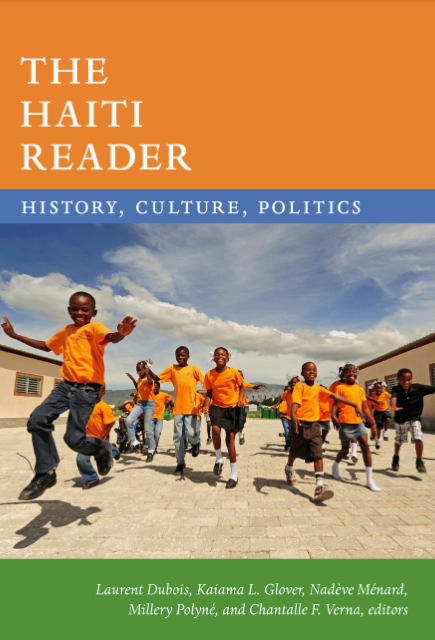
Laurent Dubois, Kaiama L. Glover, Nadève Ménard, Millery Polyné, and Chantalle F. Verna (eds)
The Haiti Reader: History, Culture, Politics
Duke University Press, 2020
544 pages
$29.95
Reviewed by Tia K. Butler
Despite being the second country to declare independence in the Western Hemisphere, Haiti has been denigrated in US media. Referred to as the “only country with the last name” among circles of Haitian studies scholars, it is near impossible to find an article on Haiti that doesn’t bookmark the island’s name with “poorest country in the Western hemisphere.” This means that many in the US view the vibrant island nation only in terms popularized by mainstream media. The editors of The Haiti Reader remind us in the introduction that, “[i]ndeed, few places have been on the receiving end of as much hostility, distortion, and fantasy on the part of outsiders.” Hoping to combat the ever-increasing hostility towards the unknown in the US, The Haiti Reader: History, Culture, Politics comes to us as a text meant to demonstrate the vibrancy and diversity of Haitian cultural and historical texts that are often missed or ignored in the US zeitgeist. With a focus on showing the reader Haiti through the voices of Haiti and its diaspora, The Haiti Reader provides the reader necessary primary source material to begin to contextualize the magnitude of Haiti’s role in world art, history, literature, and culture. Edited by giants of Haitian Studies, Laurent Dubois, Kaiama L. Glover, Nadève Ménard, Millery Polyné, and Chantalle F. Verna, The Haiti Reader is a necessary text for any scholar or student wishing to understand the importance of Haiti.
This text is multidisciplinary and provides material ranging from traditional Vodou songs like Sou lanmè— written by Anonymous and translated by Erol Josué and Laurent Dubois— that tell the story of the middle passage from the perspective of slaves being forced to Haiti, to Esther Dartigue’s posthumously published memoir that recounts, in part, the Parsley Massacre of 1937. Organized chronologically, each section of The Haiti Reader offers a mix of primary sources ranging from political doctrine to excerpts from foundational works of literature and memoirs recounting important histories. Ranging from the years Haiti spent as a colonial society following Christopher Columbus’s invasion in the fifteenth century, to a final section highlighting Haiti in the new millennium, students of any period of colonial history will find a myriad of resources earmarked with easy-to-follow introductions to the texts and their significance from the editors.
Often history misses the importance of literary production, but the editors of The Haiti Reader are careful to earmark sections with poetry and prose. Particularly poignant are the stories of migration that are scattered throughout various sections of The Haiti Reader. In the section “The Duvalier Years”, readers are introduced to Tanbou Libète (Haitian Creole for the freedom drum), an activist organization founded by exiles of Haiti that included notable members such as Michel-Rolph Trouillot, his siblings Évelyne and Lyonel Trouillot, and Guy Gerald Ménard along with other anti-Duvalier activists based in New York City in the 1970s. Editor Nadève Ménard provides a translation of a poem, “Immigration,” that succinctly demonstrates the contradictions of colonial society and US immigration policy.
Damn immigration officer
Grabs me by the collar,
Says, “You’re not a citizen”
He says “Where is?”
I say “What?”
He says “Your alien card.”
They stole and they pillaged,
They installed Duvalier,
That’s why I ran away.
Today I’m on Broadway
They all “Catch him!”
Tell me, my friends,
When the Spanish showed up,
And the Indians were forced back
Did Christopher Columbus have an alien card?
Tell me, my friends
When the white Frenchmen came here before 1804
Did Sonthonax have an alien card?
Tell me, my friends,
When they soiled our flag with Captain Batsch’s shit
Did the German ships have alien cards?
Tell me, my friends
During the occupation, when they killed Péralte,
Did the Americans have alien cards?
Translated from a recorded performance of music and spoken word, “Immigration” is an exploration of the unspoken flaws within contemporary US immigration policies, that demonstrates the beauty of Haitian voices while simultaneously expressing anger at the hypocritical treatment of the US not just through media, but through policy. The text from the 1970s is still poignant in contemporary US political debate on immigration and is an example of the important texts that have been presented to a reader for the first time.
The strength of The Haiti Reader is the way humanities and history are blended to paint a more complete image of Haiti and its cultural significance in the US While learning about the US Occupation of Haiti from 1915-1934, readers start by looking to the ‘treaty’ between the US and Haiti that led to the occupation. While a US audience may read the preamble to the treaty, “[t]he United States and the Republic of Haiti desiring to confirm and strengthen the amity existing between them by the most cordial cooperation in measure for their common advantage,” and believe the US and Haiti entered an equal agreement and not an occupation, The Haiti Reader follows the politic document with accounts of revolt and antagonism to the US interventionist policies. Read in conjunction, readers can come away with a more nuanced understanding that the US Occupation of Haiti was more an invasion than a treaty.
This accessible text is a must for anyone wishing to learn about Haiti from a Haitian/diasporic perspective. While many scholars from a plethora of backgrounds have produced thoughtful and important work on Haiti, creating a text that focuses on the Haitian cultural perspective does important work decentralizing US notions of Haiti while asking an English-reading audience to consider what is missing from their picture of Haiti, and what is the impact of that omission. Well-organized, and presented with a pleasant chronological narrative, this text will become a staple of classrooms wishing to present a clear vision of Haiti and its immense impact on the formation of the Western hemisphere.

